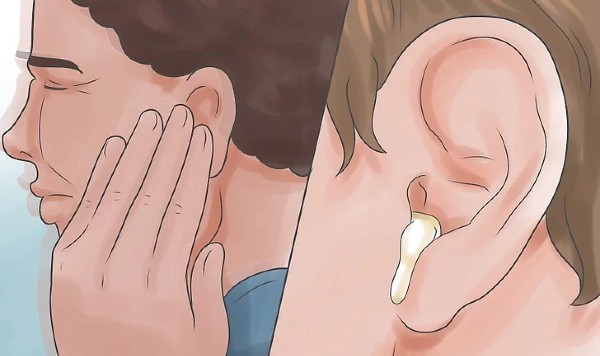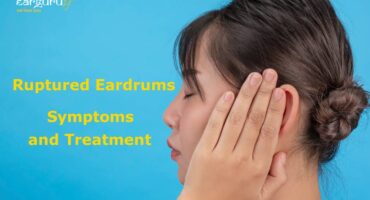Ear discharge, also known as otorrhea, is a common condition that affects people of all ages. It can be caused by a variety of factors, including ear infections, injuries, and allergies. In most cases, ear discharge is treatable. In this article, we will explore the types of ear discharge, the causes of ear discharge, and ear discharge treatment.
What Is Ear Discharge or What is Otorrhea?
Ear discharge also known as ear drainage is any fluid or liquid coming out of the ear. It can be a watery discharge from the ear or a yellow, bloody, or white discharge from the ear. It can be thick or clear fluid leaking from the ear depending on the cause of the discharge.
Table of Contents
Why Is Liquid Coming Out of My Ear?
There are many reasons for liquid coming out of your ears, brown fluid leaking from the ear is basically earwax. A little earwax is good for your ears, but if your ears produce excess earwax and the consistency is thin, then it may leak from the ears.
A ruptured ear drum caused by an injury or excess build-up of fluid in the middle ear is a common cause of ear drainage. Read on to know the causes of ear discharge and types of ear discharge.
What Are the Causes of Ear Discharge?
In most cases, the brown discharge from the ears is earwax, at times the excess earwax leaks out.
The other causes of ear discharge are:
- Middle ear infection
- Ruptured eardrum
- Swimmer’s ear
- Accidents or trauma
- Eczema
- A foreign object stuck in the ear canal
The less common causes of ear discharge are:
- Cholesteatoma – An abnormal, noncancerous skin growth or a cyst behind the eardrum.
- Malignant Otitis Externa – A severe infection of the cartilage and bones in the base of the skull
- Skull fracture
- Mastoiditis – An infection of the mastoid bone in the inner ear.
- Cancer of the ear canal.
- Inflamed adenoids – If the adenoids are inflamed, they can trap fluid in the middle ear.
What Are The Types of Ear Discharge?
The different types of ear discharge are:
- Purulent discharge (pus coming out of the ear)
- Serous or secretory otitis media (fluid accumulated in the middle ear as a result of a cold, sore throat, or upper respiratory infection)
- Bloody discharge (bloody discharge from the ear)
- Mucoid discharge (thick discharge from the ear containing mucus)
- Clear discharge (thin and watery clear fluid leaking from the ear)
Why Is My Ear Leaking Yellow Fluid?
Waxy discharge from the ear is very common, our ear produces earwax and if the excess earwax is not cleaned it will leak out as yellow discharge from the ear. It can also be a brown discharge from the ear, depending on the earwax.
If you notice ear wax leaking, it’s time to clean your ears. Read our article on tips for earwax removal at home.
Why Is My Ear Leaking Clear Fluid?
Clear fluid leaking from the ear can be water accumulated in the ear if you had a shower or a swim and have not dried your ears properly. In some cases, it can also be an indication of an ear infection.
Clear liquid coming out of the ear or yellow discharge is generally the most common type and is usually caused by a mild infection. Brown or green discharge from the ear indicates a serious ear infection.

Ear Infection Discharge
In the case of a middle ear infection or otitis media, fluid builds up in the middle ear. This is also known as Glue ear and it is a common condition that mostly affects children and occasionally affects adults. A hole in the eardrum can be the cause of ear infection discharge. The ear infection discharge color can be a good indication of the severity of the infection. Read in details about diagnosis and treatment of glue ear.
The ear infection discharge color can vary from clear liquid coming out of the ear or yellow discharge from the ear to green or brown discharge from the ear.
A ruptured eardrum can cause a white discharge from the ear, and sometimes a slightly bloody or yellow discharge from the ear.
What Causes Smelly Discharge From The Ear?
Smelly ear discharge or foul-smelling ear discharge indicates severe ear infection. The reason for the foul smell is that the ear infection is caused by anaerobic bacteria. This type of bacteria does not require oxygen to survive and results in foul-smelling ear discharge.
If your ear produces excess earwax, it accumulates in the ear canal. Dead skin and small insects can get caught in the earwax; this can result in smelly discharge from the ear.
Cholesteatoma often results in smelly ear discharge. Cholesteatoma causes recurring foul-smelling watery discharge from the ear.
Treatment For Ear Discharge
If the smelly ear discharge is due to an ear infection, you should see a doctor. If you have a good immune system, an ear infection will go away on its own. In case, the infection is severe the doctor will prescribe antibiotics. Precaution is better than cure, read our article on preventing ear infections.
Why Is Pus Coming Out Of My Ear?
An ear infection discharge can also contain pus, Pus from an ear infection is an indication that the infection is severe. Pus coming out of the ear is usually yellow or green in color and is a thick, sticky substance. If an ear infection discharge contains pus, this is usually a sign that the infection has spread.
What Is Pus In The Ear Treatment?
Since pus from the ear is a sign of a severe ear infection, a visit to the doctor is recommended.
Ear Discharge Treatment In Adults
The doctor may recommend the following medicine for ear discharge:
- Antibiotic treatment
- Medication for pain, if required
- Decongestants. Antihistamines if it’s due to allergy or nasal steroids.
Ear Discharge In Infants
Infants suffer from ear infections more often than adults; doctors do not prescribe antibiotics unless the infection is severe and can cause further complications.
Centers for Disease Control and Prevention advises caution in the case of over-the-counter medicines for children.
Do not use over-the-counter cough syrups and medicines if the child is younger than 4 years. Use cough and cold medicines prescribed by the doctor.
For pain relief give only acetaminophen if the child is younger than 6 months. For children older than 6 months, ibuprofen can be given.
Aspirin should never be given to children as it has serious side effects.
It is advisable to discuss the dosage with the doctor. Read our article on Signs of Ear Infection in Babies – Causes and Precautions.
It is important to take ear discharge seriously as it can be a sign of a serious infection. If the ear discharge does not stop in two to three days, you must contact your doctor immediately to ensure that the cause of the ear discharge is diagnosed and treated properly.
References:
• Cholesteatoma
• Centers for Disease Control and Prevention




Thank you for posting all the information about hearing loss and available hearing aids online. I’m an 82 year-old Infantry Captain who was exposed to grenade, rifle and pistol ranges, tank ranges, artillery ranges, transported in large cargo airplanes, large and small helicopters and similar loud devices provided by determined enemy soldiers, sailors and airmen on both sides of the battles. The Veterans Administration has in my case, been more than generous. I’m on my fourth set of hearing aids. Our overworked VA doctors and audiologists have never had the time to explain all the information provided in the https: //earguru.in/hearing-loss/ear-discharge-types-causes-and-treatment/ You might consider making the information and web site available to people who read the various veterans and military service publications such as “Task & Service,” the Army, Navy, Times, etc. I might have done better than stuffing cigarette filters in my ears as I kept on marching.